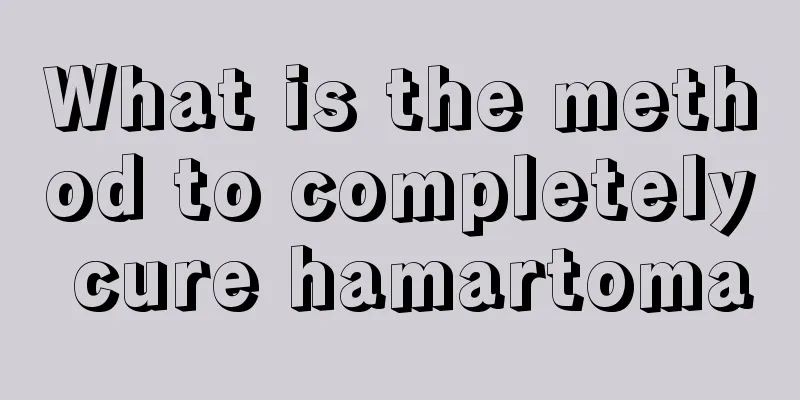What is the method to completely cure hamartoma

|
Although hamartomas are very harmful, patients need to know that they do not necessarily die from hamartomas, so patients must put down their psychological pressure and actively cooperate with doctors. So what treatment methods can improve the cure rate of hamartomas? Let me introduce some methods to completely cure hamartomas. Hamartoma refers to a tumor-like deformity caused by the incorrect combination and arrangement of normal tissues in a certain organ of the body during development. Hamartoma is not a true tumor. It grows slowly and increases with the development and growth of the body, but it stops growing to a certain extent. It is coordinated with the body and rarely becomes malignant. The following Western medicine treatments for hamartomas are very effective, many patients can be cured, and the cure rate of patients can be improved. 1. Observation Oesterling believed that tumors <4 cm can be left untreated, but close follow-up is required. Johns Hopkins reported a group of 35 cases, some of which did not continue to grow for many years. Steiner advocated that patients <4 cm should be followed up once a year even if they are asymptomatic; patients >4 cm should be followed up once every six months if they are asymptomatic or have mild symptoms. 2. Arterial embolization should be considered first in cases of bleeding. According to experience, the volume of the tumor does not decrease after embolization, but the bleeding can be stopped. Superselective renal artery branch embolization is often used to protect some renal function. 3. Nephron-sparing surgery: Tumors <5cm can be enucleated, especially those at the edge of the kidney. However, some tumors have unclear capsules, irregular shapes, and unclear interfaces, making enucleation unsafe. In this case, partial nephrectomy can be performed. 4. Nephrectomy: Giant renal hamartomas can be treated with nephrectomy; if the disease is bilateral, more consideration should be given to the preservation of renal function; in a few cases, there may be local and lymph node invasion, or even tumor thrombus invasion of large veins, showing malignant behavior, and radical nephrectomy should be performed. 5. Kidney transplantation or hemodialysis is only suitable for patients who must undergo bilateral nephrectomy due to bilateral lesions leading to renal failure or tumor rupture and bleeding. |
<<: How to treat hamartoma effectively
Recommend
After so many years of recurring diarrhea, I finally found the "real culprit"
Many people don’t know what foods are good to eat...
Patients should choose appropriate breast cancer treatment according to their different conditions
Breast cancer is very harmful and can cause great...
What to do if you have acne on your face
If a person's facial skin is well maintained,...
What diseases can nails cure
Whether it is the fingernails or toenails on the ...
How to take better care of liver cancer? 4 good ways to actively prevent liver cancer
Liver cancer is also one of the more common cance...
Which diseases should laryngeal cancer be differentiated from?
Laryngeal cancer is common in middle-aged men, ac...
What vegetables and fruits should we eat in autumn
Eating more vegetables and fruits can effectively...
What's the matter with the two blue veins under the tongue?
The tongue is a relatively important organ in the...
How to recover after an all-nighter
Many people have to work overtime at night due to...
Why does the outer left leg tendon hurt?
Most of our friends have experienced leg cramps, ...
What's wrong with chest pain
When the chest hurts or feels stuffy, it will cau...
Is 50 of 80 normal for blood pressure?
Blood pressure has a certain normal value. If the...
Does ovarian tumor affect pregnancy?
Ovarian tumors can be benign or malignant. Due to...
How long does it take for nasopharyngeal carcinoma to metastasize
How long does it take for nasopharyngeal carcinom...
The diaper has a pungent smell
The choice of diapers is very important for babie...









